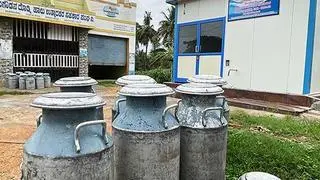Indonesia will lift the ban on exports of crude palm oil (CPO) and refined, bleached deodorised (RBD) palm oil from May 23, providing much relief to countries such as India from soaring cooking oil prices.
Indonesian President Joko Widodo announced on Thursday to lift the ban after imposing it almost a month ago. It had resulted in CPO futures for July and August dropping by at least 60 Malaysian ringgit (MYR) on Bursa Malaysia Derivatives to 6,303 MYR and 6,074 MYR, respectively.
The Indian edible oil sector welcomed the Indonesian move with Indian Vegetable Oils Producers Association (IVPA) President Sudhakar Desai saying palm oil prices had already dropped by $200 a tonne to $1,750 in anticipation.
Indonesia’s compulsions
Solvent Extractors Association of India Executive Director BV Mehta said palm oil supplies will increase and soften the prices to some extent.
Last week, BusinessLine had reported that Indonesia would have to lift the ban as farmers had stopped production, while the processing units had stopped purchasing fresh fruit bunches (FFB) from growers on overflowing storages.
Abdul Hameed, Director- Sales, Manzoor Trading in Lahore, Pakistan, said the drop in palm oil prices could be limited as Indonesia’s policy on domestic market obligations and taxes were not clear.
Indonesia has lifted the ban despite not achieving its objective of bringing down cooking oil prices to 14,000 rupiah (₹74) a litre. “Domestic prices in Indonesia are still ruling high at 17,000 rupiah (₹90). The Widodo government was worried that high domestic stocks of about 5.7 million tonnes and overflowing storage and port tanks would affect small growers, who harvest 500 kg FFB every day,” Hamid said.
Malaysia gains
The Indonesian government has decided to launch 10,000 discount outlets to sell cooking oil at 14,000 rupiah, he said.
IVPA’s Desai said Indonesia had begun to face internal issues such as farmers’ protests, logistical issues and a lack of storage space. On Tuesday, Indonesian farmers staged a protest demanding the Widodo government to lift export ban.
Hamid said Malaysia had gained from the Indonesian ban with its exports of palm group of oils rising this month. “Malaysia production and end-stocks are expected to lower. It could have pushed up prices, but the Indonesian move will now cool the market,” he said.
SEA’s Mehta said Indonesia supplies 3 lakh tonnes of palm oil every month to India and Malaysia was not able to meet the demand.
Desai said the market’s direction will now depend on demand, especially from China and India. Hamid said Malaysia and Indonesia could factor in increased production costs in palm oil pricing.
War compounds situation
Desai said Indonesia’s export tax on CPO was is $575 a tonne and $408 for refined palm oil. “Considering this, the Centre should increase the Indian duty differential to stop the flooding of refined palm oil to protect the Indian refining industry,” he said.
The Indonesia palm oil export ban compounded the misery of Indian consumers, who were burdened over a year-and-a-half by soaring edible oil prices in view of the Russia-Ukraine war, weather affecting production in South America and palm oil output affected by a labour shortages.
The war, in particular, came as a heavy blow since it has affected sunflower oil supplies from Ukraine, the top exporter, since February 24.
India has responded to the spike in edible oil prices by cutting customs duty to zero and reducing agricultural infrastructure cess, but it has not yielded the desired results.
(With inputs from Rutam Vora, Ahmedabad








Comments
Comments have to be in English, and in full sentences. They cannot be abusive or personal. Please abide by our community guidelines for posting your comments.
We have migrated to a new commenting platform. If you are already a registered user of TheHindu Businessline and logged in, you may continue to engage with our articles. If you do not have an account please register and login to post comments. Users can access their older comments by logging into their accounts on Vuukle.